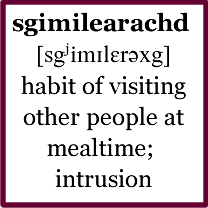
Here’s a recording in a mystery language.
Can you identify the language, and do you know where it’s spoken?

Here’s a recording in a mystery language.
Can you identify the language, and do you know where it’s spoken?
A ragout is a highly seasoned meat and vegetable stew, and comes from the French ragoût, which appears to be a general word for stew.
Ragoût comes from the Middle French ragoûter (to awaken the appetite), which comes from the Old French re- (back), à (to) and goût (taste), from the Latin gustum (taste), from gustare (to taste, take a little of) from the Proto-Indo-Etymology *gus-tu-, a form of the root *geus- (to taste, choose), which is the root of the English word choose, and the German word kosten (to taste of) [source].

Last week I went to a concert that featuring a jazz pianist and an artist. While the pianist played, the artist painted on her iPad, which was connected to a projector and projected on a big screen. The artist created pictures based on the music, and I think the pianist also created some tunes based on the art. It was all very abstract, especially the art. During the concert I was looking for patterns, shapes or anything in the art that looked like something familiar. I didn’t find much, but enjoyed the experience anyway.
Afterwards I got thinking about patterns and familiarity and came to the conclusion that we tend to feel most comfortable with the familiar – familiar people, things, places, sounds, etc – i.e our comfort zone. When we encounter the unfamiliar we try to find anything in it we can make sense of. We look for patterns, and anything else we can recognise. If we cannot find such things we may decide that the unfamiliar is not for us.
Abstract art and some forms of music, for example, are sometimes said to be “challenging”, and I think this is because there is little in them that is familiar, and this is why it takes longer to appreciate them – we need longer to find any patterns they may contain and for them to become familiar.
When we first encounter a foreign language everything is unfamiliar, and this can put a lot of people off. However a language that has a lot in common with your mother tongue can be easier to learn than one that has little or nothing in common with it as you will find more that is already familiar, and probably feel more comfortable with it.
To become familiar with the patterns, sounds, words and structures of a foreign language we need to get a lot of exposure to it – i.e. listen, read, and watch films and TV programmes. Doing these things alone is not enough to learn a language – you need to speak it and maybe write it as well – but they will make it more familiar to you.
The more you learn of a language, the more patterns you will spot within it, and the easier it will be to spot those patterns. The patterns might be how words are put together to form sentences, how grammatical changes are applied to words, how words can mean different things in different contexts, how speakers interact with one another, what topics are appropriate to different situations, and so on.
So you may need to get outside your comfort zone at first, but over time your comfort zone will expand to include the new language.

Here’s a recording in a mystery language.
Can you identify the language, and do you know where it’s spoken?

Sgimilearachd [sgʲimɪlɛrəxg], noun = habit of visiting other people at mealtime; intrusion (from: Am Faclair Beag)
Alternative definition: Obtrusiveness, impudence, intrusion; Mean habit of popping in upon people at meals, living and doing nothing about, gentlemen’s kitchens. (from: Am Faclair Dwelly)
This is one of the interesting Scottish Gaelic words I learnt from this blog post. Others include:
– Allabhuadhach = someone who is victorious, but in disgrace.
– Claidean = an absurd hammering at anything.
– Nigead = those little sobs or sighs you make before or after weeping.
– Atamaich = to fondle an unreasonable person.
Do similar words exist in any other languages?
I came across a new word yesterday – adumbrations – which I had to look up in a dictionary as I couldn’t work out its meaning from the context:
Framed in the archway formed by the far end of the vaulted roof were the fantastical forms of five great gasometers, the supporting superstructures of which seemed in their adumbrations to be tangled impossibly with each other, like the hoops of an illusionist’s conjuring trick.
From The Long Dark Tea-Time of the Soul, by Douglas Adams.
According to the Reverso dictionary, adumbration means
1. delineation, draft, indication, outline, rough, silhouette, sketch, suggestion
2. augury, forecast, foreshadowing, foretelling, omen, portent, prediction, prefiguration, prefigurement, presage, prognostication, prophecy, sign
3. bedimming, cloud, darkening, darkness, eclipse, eclipsing, obfuscation, obscuring, overshadowing, shadow
A related word is adumbrate, which means “to outline; give a faint indication of; to foreshadow; to overshadow; obscure.
It comes from the Latin word adumbratus (represented only in outline), from adumbrare (to cast a shadow on), from umbra (shadow) – obvious really!
| français | English | Cymraeg |
|---|---|---|
| le ragoût; | stew | stiw; lobsgóws |
| (faire) mijoter; cuire en ragoût | to stew | stiwio; mud-ferwi |
| le ragoût de mouton | Irish stew | lobsgóws; cawl; pwt y berw |
| le pot-au-feu | beef stew | stiw eidion |
| le navarin d’agneau | lamb stew | stiw oen |
| le civet de cheveuil | venison stew | stiw fenswn/feneiswn |
| le ragoût de légumes | vegetable stew | stiw llysiau |
| ça m’a rien donner | I have nothing to show for it | nid oedd gennyf ddim i’w ddangos er |
| ça a fait tilt | the penny dropped | syrthiodd y geiniog |
| épeler | to spell (aloud) | sillafu |
| écrire; orthographier | to spell (in writing) | sillafu |
| la zone humide la terre humide |
wetland | tir gwlyb; cors; corstir; tir corsiog |
| la tourbière | bog (wetland) | cors |
| la tourbière | peat bog | mawnog; mawndir |
| la tourbe | peat | mawn |
| trotter | to trot | tuthio; trotian; trotio |
| trotteur | trotter | tuthiwr; trotiwr |

Are there times when you don’t feel like learning languages and can’t summon up much enthusiasm about them? When language learning lethargy strikes, in fact.
For me most of August this year was like that – I did use my languages when I had the chance, and spoke quite a bit of French and Welsh, and odd bits of Italian and Irish. I also listened to plenty of foreign language radio, as I often do. I didn’t go out of my way to find opportunities to practise my languages though, and didn’t study at all for almost the whole month. This is unusual for me.
Sometimes I think to myself, “You already speak five languages more or less fluently, and know quite a few others to varying degrees. Isn’t that enough?”, and my usual answer is “No, I want to learn more!”. Recently however, my motivation to learn more has been low and my answer was “Yes, that’s enough for now.”
This month I am re-starting my studies with Czech, and am planning to start dabbling with other languages as well. Yesterday my Teach Yourself Swedish course finally arrived – the one I got for free after attending the Polyglot Gathering in Berlin in May. So I will be learning more Swedish before long.
If you come down with language learning lethargy from time to time, how do you deal with it?